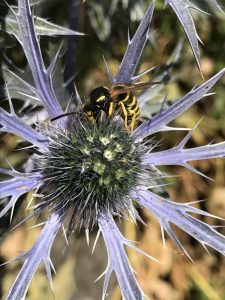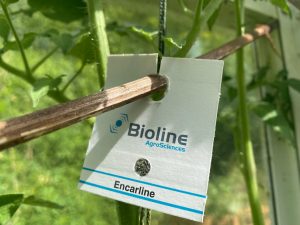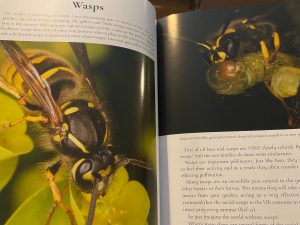What do wasps do?? What’s the point of wasps?? These are commonly uttered, exasperated questions of wasp-laden summers.
Wasps need a new PR agency. They are badly misunderstood, hugely persecuted and victims of incredible abuse. All because they dare to gate crash our summer parties and from time to time kick back.
Yes some wasps sting, but so do honeybees and bumblebees can sting too.
But wasps are an incredibly important part of the garden biodiversity. The wasps that annoy us in the summer are just a few of the thousands of different wasps in the UK.
Invite them to the party
By mid to late summer it’s the social wasps we notice in our gardens, so-called not because they invite themselves to our summer gatherings but because they live in a colony, with a queen, workers and males just like our bumblebees and the honeybee.

If you are planning a lunch out of doors, invite the wasps to the party. Place an almost empty jam pot somewhere else in the garden. Give them some fizzy pop in a shallow bowl for a sugar fix and tell your guests about the good that these wasps do.
These unwanted guests are not just pollinators but they are also incredible garden ‘pest’ control. And that’s because they feed their babies grubs and other insects. The adult wasps collect caterpillars, aphids and other insects to fatten up their babies and that means they clear our gardens of what many gardeners regard as pests. In fact it is estimated that in the UK the social wasps clear 14 million kilograms of insect prey from the environment. So just imagine what a world without wasps might look like?
So we need to embrace the wasps as beneficial insects with a vital role to play.
I have a large wasp nest in my garden right now. And I had dozens of caterpillars on my kale and broccoli, that have been completely cleared. I do have nesting birds, but I suspect the wasps have been collecting them for their offspring.
Greenhouse allies
Greenhouse gardeners will be familiar with tomato whitefly. In fact it’s not just tomatoes that suffer from this sap-sucking insect. It doesn’t take long for plants to start to show signs of an infection. Reduced vigour, sooty mould on the leaves and foliage yellowing and dropping off prematurely. Last season I accidentally introduced greenhouse whitefly into my greenhouse, which was hugely disappointing. But thanks to a microscopic wasp that was supplied weekly from Green Gardener, the little white ghost-like flies appear to be history. Within the wasp family are many parasitic wasps that use the larvae and life cycle of other creatures to raise their own larvae. And so it is with Encarsia formosa, it’s a naturally occurring wasp that lays its eggs inside a whitefly scale. It’s a biological control that keeps plants free from pesticides and toxins and basically allows nature to control the problem as it would naturally. The eggs develop into baby wasps and emerge from the whitefly scales as adults. It’s simple, effective and as the ‘product’ arrives weekly in the post it’s incredibly easy to use.

There are now parasitoid wasps available commercially that can be used to help control all sorts of other ‘pests’ from greenhouse aphids and soft scale, to poultry farm flies and even the dreaded clothes moth. It’s another winning story for Wasp PR and an important reminder that most things are a meal for something else.
Wonder Woman
Queen social wasps make the most incredible citadels from wood fibre, stripping fences and timber masticating them into a kind of papier-mache. Forming fantastical castles to raise their babes. But did you know that there is a solitary wasp that crafts incredible clay urns, like mini olive oil caskets, attached to the stems of heather plants. And inside the adult female lays an egg and then packs the urn full of caterpillars and other prey to provide a packed lunch for her babies. She is called the Heath Potter wasp; she is quite rare, but absolutely amazing. It’s another example of the wonder of wasps and I share it with you in the hope that you might fall in love just a little bit more with this incredible creatures that are vital pollinators and just as important in our ecosystem as every other living creature or organism.

If you’d like to learn a little bit more about wasps and other unlikely pollinators you might like my new book Attracting Garden Pollinators.
There’s a whole section about wasps that introduces a few of these unsung garden heroes. Author signed copies are available from my website. www.TheGreenJeanie.com










